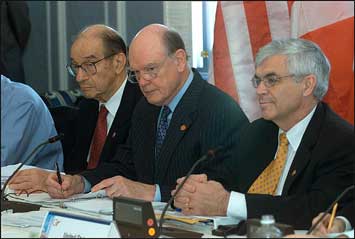
Conventional wisdom suggests that the collapse of Lehman Brothers precipitated the meltdown that followed, but Kim Thomas, in a letter to the editor of the Financial Times yesterday ("Not All Observers Agree on effect of Lehman Collapse"), offers a different take, drawing on research by Stanford University economics professor John Taylor (the gentleman on the right in the photo above). The text of Mr. Thomas's letter is below.
Sir, Contrary to the assertion by Edward Luce (“Obama signals overhaul of economy”, January 9), it is not a truth universally acknowledged that the failure of the authorities to save Lehman Brothers triggered the financial meltdown.
An event study by John Taylor of Stanford University (in The Financial Crisis and the Policy Responses: An Empirical Analysis of What Went Wrong, available at www.stanford.edu/~johntayl/ ) using the three-month Libor-OIS spread as a measure found a small increase in financial market turmoil, within the normal range of fluctuations, occurring on September 15, the Monday after the weekend decisions not to bail out Lehman Brothers.
That was followed by a slight decrease in turmoil around the time of the American International Group intervention of September 16 and then a moderate rise, still within the normal range of fluctuations, for the rest of that week. It was only after the announcement of the troubled asset relief programme on September 19 and particularly after the testimony of Treasury secretary Hank Paulson and Fed chairman Ben Bernanke of September 23 before the Senate banking committee - in which they presented a two-and-a-half page proposal for legislation with no plans for oversight and few restrictions on use of the funds - that the measure of turmoil began what Prof Taylor describes as a "relentless upward movement" that lasted three weeks until it "went through the roof".
Prof Taylor argues that the failure to bail out Lehman Brothers was only one element in a sequence of government policy decisions that had exhibited a lack of consistency and clarity of purpose since at least the Bear Stearns intervention the previous March. He suggests the lack of coherent policy was first laid bare for all to see on September 23.
After that the public seemed to conclude that conditions must be much worse than they had been led to believe previously, and firms suddenly faced considerably more uncertainty in making business and investment decisions.
Kim C. Thomas,
San Jose, CA, US
The photo above is from Professor Taylor's Stanford website.


